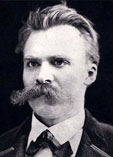"Mathematical expression is not a part of the essence of philosophy." -- from Nietzsche's Early Notebooks
"After the pre-Socratic Greeks, philosophers are no more than grimacing figures, pale and depressed, theological counterfeiters. Logic and reason prevail over intuition and the artistic drive." -- Sarah Kofman, Nietzsche and Metaphor
Asking whether Nietzsche was a poet or a philosopher makes the presumption that poetry and philosophy are in some way contradictory, and that mathematical logic is the 'essence' of philosophy. This is the fallacy of conceptual thinking which forgets that all truths are just "illusions which we have forgotten are illusions, metaphors which have become worn out and have been drained of sensuous force, coins which have lost their embossing and are now considered as metal and no longer as coins."
Conceptual thinking represses metaphor, using it only for didactic reasons or as a temporary stop-gap until a pure conceptual formulation can be found. Metaphor is thus confined to the poetic sphere: the poets talk about imagery and feelings, while the contemplative philosopher-sage, friend of wisdom and ascesis, maps the walls of his conceptual prison with great solemnity. Sensations are dissolved into concepts; the pre-Socratic Greeks become the Socratic Greeks.
Nietzsche's classical education allowed him to see beyond the 'Abyss of the Concept' inaugurated by Socrates and Plato, and back towards the pre-Socratic Greeks, whose creative philosophy he found superior to the conceptual philosophy which followed it. Nietzsche's aphoristic form of writing, so often misunderstood, did not come about by accident — the variable length of entries, the polyphony of voices, and the privileging of metaphor were already present in the philosophers of antiquity.
Drawing on the works of Nietzsche himself (especially The Birth of Tragedy and The Genealogy of Morals) and also the French philosophers who followed him, I will try to show that conceptual thinking can be seen as a sign of weariness and that philosophy should instead be an affirmative, creative activity which "deletes all oppositions with one great burst of laughter".
'On Truth and Lie In An Extra-Moral Sense'
The short essay 'On Truth and Lie In An Extra-Moral Sense' is a concise statement of Nietzsche's views about Metaphorical Writing versus Conceptual Writing, and is a good introduction to the subject. It's well-written and easy to read, and you can download it here:

